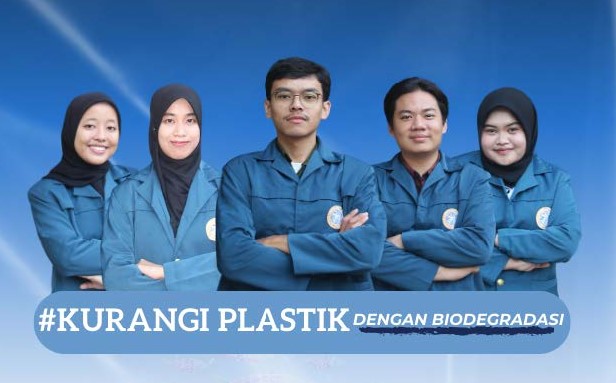
5 Ksatria Airlangga UNAIR Student Creativity Programme (PKM) team in the field of Exact Research successfully passed the funding stage from the Ministry of Education and Culture-Ristek RI, consisting of Muhammad Fahmi, Anisa, Istiana Putri, Farra Dibha Nur Hakiki, and frederick Liui from the faculty of science and technology Biology study programme (Source: Personal documentation).
Accompanied by Prof. Dr Ni’matuzahroh, the team brought up the idea of plastic degradation by microorganisms.
Based on recent data, Indonesia has a large amount of plastic usage, which has led to the rapid emergence of plastic waste. If left unchecked, plastic waste can cause environmental pollution and harm the surrounding environment. With this problem, an interesting idea emerged from one of the teams, Muhammad Fahmi, commonly referred to as Fahmi as the team leader. The team members, who were conducting ecophysiological research at the time, found plastic containing Diospyros javanica leaf waste in a condition filled with protrusions. The protrusions were seen penetrating the plastic, causing the plastic to perforate. With this phenomenon, one of the team surmised and assumed that the holes in the plastic were not caused by punctures or ordinary damage, but were caused by the presence of microorganisms.
As a student of the Biology study programme, an interesting thought was generated by the discovery of the plastic with the bulge. One of the team suspected that the microorganisms that managed to penetrate the plastic had the ability to degrade the plastic.
“Well, look at this plastic, the plastic has holes, and in this plastic there are microorganisms such as moulds. Hmm, it looks like this mould is a plastic degrading mould. What if we turn this phenomenon into research through PKM?” He said at the time.
Fahmi and his team came up with the idea as a solution to deal with plastic waste in Indonesia. “Plastic waste in Indonesia is increasing day by day. Many Indonesians involve plastic in their daily activities,’ he explained. One of the other team members also had the same opinion regarding this matter. ‘If it is true that the phenomenon of holes in plastic is caused by the presence of moulds that use carbon sources from plastic, we can reduce the amount of plastic waste by the action of biodegradation by moulds,’ said one of the team members.
The interesting discovery was raised as a new idea to join the PKM programme, especially in the field of Research (RE), with the hope that the leaf samples found can be isolated and purified from microorganisms, especially the mould, and tested how much potential the mould has in using carbon as a source of nutrition ‘We raised this theme in PKM-RE, because we wanted to do research to confirm the potential of the mould in degrading plastic. Our hope is that this discovery will be a solution for handling plastic waste in Indonesia that is environmentally friendly, because it uses biological agents so that the end result of the degradation process is not a toxic agent,’ said one of the team.
This discovery is expected to contribute to Universitas Airlangga, especially the Biology Study Programme, where isolates from the research results will be donated to Airlangga Collection Culture (UACC) for further research as a special potential for biodegradation research using this fungus.
